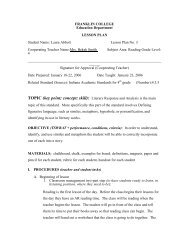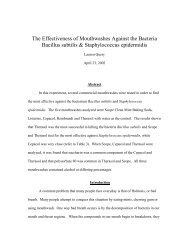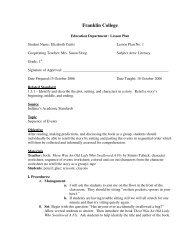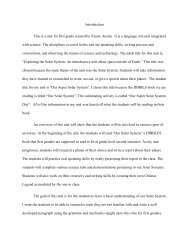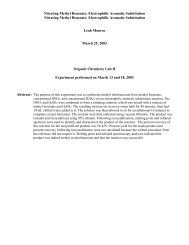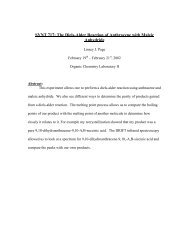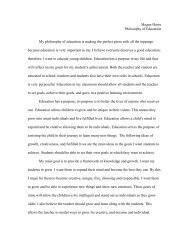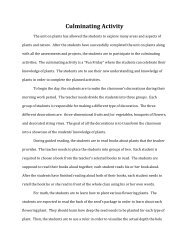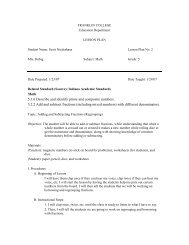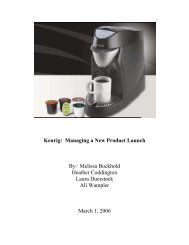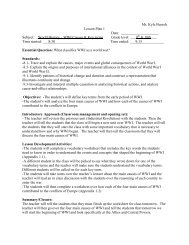09 autumn reporter 1-20 - Franklin College
09 autumn reporter 1-20 - Franklin College
09 autumn reporter 1-20 - Franklin College
Create successful ePaper yourself
Turn your PDF publications into a flip-book with our unique Google optimized e-Paper software.
<strong>College</strong> earns governor’s award<br />
PHOTO BY DENISE SZOCKA<br />
Pictured in the front are: Tom Patz, manager for organizational development and safety, Thomas Easterly,<br />
commissioner of the Indiana Department of Environmental Management, Carmen Alejo ’11 Green Team<br />
student leader, Ray Pena ’12 Green Team student leader, Lisa (Combs) Fears ’89, vice president for<br />
planning, plant and technology, and Rick Bossingham, assistant commissioner of IDEM’s Office of Pollution<br />
Prevention and Technical Assistance. In the back are: Les Petroff, food service director, Mark Lecher ’00,<br />
director of plant operations; Alice Heikens, biology professor, Betsy Schmidt ’85, director of development<br />
research, and Larry Bridges, superintendent of grounds.<br />
By Samantha Parker ’11<br />
Pulliam Fellow<br />
<strong>Franklin</strong> <strong>College</strong> has received an Indiana Governor’s Award for Environmental<br />
Excellence in recognition of its campus composting program.<br />
During a ceremony held on Sept. 10 at the Indiana University Purdue University-<br />
Indianapolis campus, Indiana Department of Environmental Management Commissioner<br />
Thomas Easterly presented the award to college representatives Tom Patz, project manager<br />
for organizational development and safety, and Lisa (Combs) Fears ’89, vice president for<br />
planning, plant and technology.<br />
Through the college’s award-winning composting program, yard and appropriate<br />
cafeteria food waste was collected and deposited into bins located on campus. Faculty<br />
members integrated the program into their courses by asking students to keep statistics<br />
and data to determine what combination of brown and green materials resulted in the<br />
fastest breakdown of materials and what produced the best nutrient-rich compost.<br />
Compost harvested from the bins was used in landscaping around campus.<br />
The composting efforts resulted in 50 tons of waste being converted, saving the college<br />
approximately $6,500 in vendor fees and landscaping materials. The composting program<br />
is just one example of the college’s comprehensive commitment to campus “greening,”<br />
said Patz. Other efforts include installation of energy-saving lighting, green classroom<br />
practices, native tree planting, recycled material purchases and student and community<br />
educational program development.<br />
“We are thrilled that <strong>Franklin</strong> <strong>College</strong> has received this recognition from the governor’s<br />
office,” said Patz. “Our campus Green Team is a wonderful example of the collaboration<br />
that occurs at <strong>Franklin</strong> <strong>College</strong> in an engaged, talented and active community of lifelong<br />
learners.”<br />
The Green Team is a voluntary committee of student leaders, alumni, faculty and<br />
staff who influence how decisions are made and resources are allocated to achieve the<br />
institutional goal of climate neutrality. The college president and his cabinet members<br />
also are involved.<br />
Trayless dining helps<br />
support campus greening<br />
By Amy (Kean) VerSteeg ’96<br />
Editor<br />
Returning students may have noticed<br />
something missing from the dining hall<br />
the first time they had a meal in the Napolitan<br />
Student Center — plastic trays. Sodexo food<br />
services introduced the trayless dining<br />
concept at <strong>Franklin</strong> <strong>College</strong> in August.<br />
According to food service director<br />
Les Petroff, the college has seen a reduction<br />
of about 1,000 gallons of water usage per<br />
week since the change was implemented.<br />
The amount of detergents and electricity<br />
needed for clean-up also has been reduced.<br />
Over the long run, dining overhead should<br />
reduce as the need to purchase or replace<br />
trays diminishes.<br />
Sodexo Inc., parent company of <strong>Franklin</strong>’s<br />
student dining services, began challenging<br />
college campuses to go trayless in <strong>20</strong>08 as<br />
part of a corporate commitment to reduce<br />
water, waste and negative impact on the<br />
environment. In the first year, the company<br />
reported that 150 of its 600 campus clients<br />
retired their trays, which calculated to be a<br />
savings of about <strong>20</strong>0 gallons of water a day<br />
per 1,000 meals served.<br />
In a press release, Tom Post, president of<br />
campus dining for Sodexo Inc. said,<br />
“Campuses that have tossed the trays also<br />
report reduced food waste.”<br />
Some colleges cite that trayless service<br />
also has helped decrease over-eating among<br />
students because they opt to keep socializing<br />
during mealtime rather than leave the table<br />
to get more food.<br />
According to the USDA, Americans waste<br />
almost 25 percent of all food produced<br />
annually in the United States, every person<br />
generates 1.3 pounds of food waste daily<br />
and food waste accounts for 12 percent of all<br />
U.S. landfill material.<br />
WWW.FRANKLINCOLLEGE.EDU AUTUMN <strong>20</strong><strong>09</strong> 13






